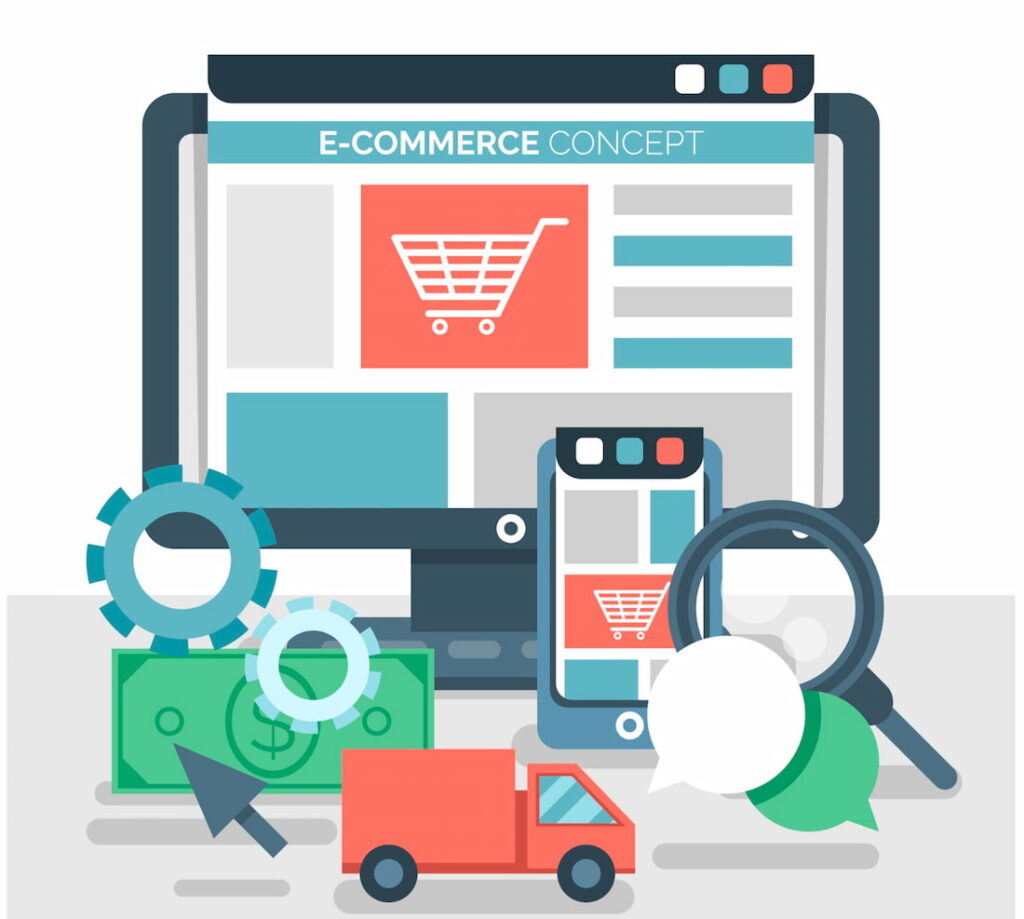Introduction to Building eCommerce Website
eCommerce, also referred to as “Internet Commerce” or “Electronic Commerce,” involves the selling and purchasing of goods throughout the Internet and includes the transfer of data and money.
It is a booming sector that does not seem to be going away anytime soon, or even slowing down, for that matter. eCommerce popularity is due to various reasons, but namely, it boils down to the sheer convenience, affordability, and variety that accompany it.
The Power of Online Selling
The world we know today has become very fast-paced, with online shopping becoming a game-changer in several aspects, revolutionizing the manner in which we shop and bringing a range of benefits to the table. Its power cannot be overstated, as can the convenience of buying with the click of a button.

The Importance of a Well-Designed eCommerce Website
For any business, their eCommerce website is like their store, and a decent website design is among the most efficient tools that any eCommerce firm can benefit from. From the mere placement of a firm’s logo on their web page, website usability and appearance, along with the customers’ experience, can drastically improve; however, if designed professionally, that is.
Process of Building eCommerce Website
At times, customers will link a website’s quality with whatever product or service a firm is providing, which is why properly designing a website is so important and can be a really effective tool for eCommerce firms.
A Step-by-Step Guide to Creating Your Online Store
Outlined below are some steps that you will have to go through when properly creating your own eCommerce website, from market research and choosing the appropriate platform to design considerations and product listings.
- Market Research and Niche Selection
Any website creation process starts with market research and carving out a niche for your services. This can involve looking into how other eCommerce websites are structured, the price of the products they’re offering, what is known to work and what doesn’t, etc.
- Choosing the Right eCommerce Platform
Following market research, you have to select the appropriate platform to build your website upon. Whether it be building eCommerce website with WordPress, Squarespace, or Weebly, look into the different platforms and evaluate their features and whether they meet your requirements or not.

- Design and Layout Considerations
Once the platform has been selected, decide on how you want to present your website and research the various different layouts that you can use to structure your website depending on the products you’re selling and more, so that the user experience of your website is top-notch.
- Product Listing and Inventory Management
Next, you will have to determine how you’re going to list the products you’re selling—basically, inventory management. By implementing good inventory management procedures, information regarding which goods are understocked, overstocked, out of stock, or in stock can be easily accessed, along with eliminating underselling, overselling, and marketplace fees.
- Payment Gateway Integration
Every eCommerce website has its own payment gateway, which is a technology that online merchants utilize to accept credit or debit card purchases from customers. In other words, it is a vital component that will always need to be set up to enable payments on your eCommerce website.
Planning for SEO and Marketing
Having robust SEO (search engine optimization) and other marketing strategies can help your website rank higher in the search results for keywords pertaining to your business. With the correct SEO strategy, businesses can drive considerably more valuable traffic to their website.
SEO Optimization Strategies
There can be several SEO optimization strategies out there, but there are a couple of things that most of them have in common. These include looking more into keywords, particularly long-tailed keywords, getting backlinks, increasing page loading speeds, etc.
Digital Marketing Tactics
There are many digital marketing tactics that firms utilize in their eCommerce endeavors. But among the most popular definitely include social media and influencer marketing, and even affiliate marketing at times.

Options for the Process of Building eCommerce Website
Now that you are aware of the things that you need to do when constructing an eCommerce website, you can move on to selecting the platforms where you will actually build your website.
Exploring Different eCommerce Development Platforms
There are many eCommerce development platforms out there, and choosing the right one can take a while. Usually, many platforms do offer a free trial of their services, allowing you to try out their features. But, if you’re in a bit of a hurry, outlined below are two of the more common platforms utilized within the space.
- Shopify – A Leading eCommerce Platform
Anyone looking to build an eCommerce website is bound to come across Shopify sooner or later. It is an all-in-one eCommerce website builder that businesses, small or large, may utilize to sell products on social media platforms and third-party marketplaces or construct online stores of their own. The services it provides can cover inventory management, shipping discounts, banking services, etc.
- Building eCommerce Website with WordPress
Building an eCommerce website with WordPress is a popular choice for many businesses due to its user-friendly interface and extensive range of plugins and themes tailored for online stores. When building an eCommerce website with WordPress, you can utilize plugins like WooCommerce to easily set up product listings, manage inventory, and process transactions. Additionally, customizing the design of your eCommerce site with WordPress themes allows you to create a unique and visually appealing storefront. With the flexibility and scalability offered by WordPress, building an eCommerce website with WordPress provides businesses with a powerful platform to showcase and sell their products or services online.

- WooCommerce – The WordPress eCommerce Plugin
WooCommerce is a popular WordPress plugin dedicated to eCommerce. It makes building and managing online stores easy, with reasonable flexibility levels and numerous essential features like tax and inventory management, shipping integration, and secure payments.
Selecting the Right Platform for Your Business
Selecting the appropriate platform for your firm involves a couple of factors that should be considered.
- Scalability and Customization
The platform that you choose should incorporate an ample number of customization features to give your website that unique feeling you’re looking for, and it should also be scalable enough to handle more traffic and allow quicker loading speeds.
- Ease of Use and Support
The onboarding process should feel smooth, or the ease of use should be catered to enough so that you can get a hang of things quickly. Complexity can often add more time to the creation process. But if you’re having a hard time, then the support provided should be sufficient to handle your requirements.
Process of Building eCommerce Website: Different Ways
To build an eCommerce website with Python, you can utilize frameworks like Django or Flask to handle backend functionality such as product management and user authentication. When building an eCommerce website from scratch, start by designing a user-friendly interface and integrating essential features like shopping carts and payment gateways using HTML, CSS, and JavaScript. Incorporating JavaScript libraries such as React or Angular can enhance the interactivity and responsiveness of your eCommerce website, improving user experience and engagement.
Comparison of eCommerce Creation Platforms
Comparing the various different platforms out there can definitely be a bit overwhelming when initially embarking on the eCommerce route, but there are a few fairly common and easy factors to note when doing so.
Analysis of Leading Platforms
Outlined below are the most common factors that people consider when comparing different platforms.
- Features and Functionality
What features the platforms provide and whether they work as expected are the most common factors that anyone will look at. Naturally, you would want as many options as possible so that you have more tools at your disposal when constructing your website.
- Pricing and Transaction Fees
Another common factor is pricing or subscription fees for the various plans that each platform provides. They should be reasonably priced according to the features being provided.

Pros and Cons of Different Platforms
Every website will have its own share of pros and cons, and evaluating them to determine which option suits you is just as important.
- Flexibility vs. Simplicity
The platform should be easy to use, but that doesn’t necessarily mean that it should be devoid of complexity, particularly for developers more advanced in the field. This is where flexibility comes in, in that the platform should be able to cater to both beginners and experts.
- Budget Considerations
Besides flexibility, the platforms should be budget-friendly, and be able to cater to the requirements of small firms, which comprise the majority of businesses out there.
Recommended eCommerce Creation Sites
This section will cover the eCommerce creation platforms that you will find to be more often recommended by review sites.
Top Platforms and Services for eCommerce Building
Below are some of the more popular services or products for building eCommerce websites.
- eCommerce Development Agencies
eCommerce development agencies help with anything from developing and designing websites to incorporating shipping options and payment processing. They can aid one in SEO and marketing, so they can begin attracting consumers and generate sales. The Free Website Guys, Magneto IT Solution, and SmartSites are a few examples of such agencies.
- eCommerce Website Builders
Unlike agencies, website builders simply offer the tools with which to build the website you want, they don’t build it for you. Shopify, Weebly, Squarespace, and WooCommerce, are a few examples of the popular builders being used.
Factors to Consider When Choosing a Service
When choosing an agency or a builder, there are a couple of things worth considering to make your judgments more informed.
- Reputation and Client Reviews
Always go for the more popular options since you know they are being used by many and many have found them to be worthwhile. At least that way, you might be sure of the quality being offered. But if you want to try something else, then maybe look for client reviews, of which there should be a considerable number, to be sure of its quality.
- Project Portfolio and Expertise
A lot of the time, website builders and agencies will provide examples of the websites that have been built through them, so evaluate their work for yourself to see if it’s worth your time.

Cost of Building an eCommerce Website
When considering the cost of building an eCommerce website, it’s essential to factor in various expenses associated with development, design, and ongoing maintenance. Initially, the cost of building an eCommerce website can vary significantly depending on factors such as the complexity of the site, the size of the product catalog, and the desired features and functionalities. Hiring developers, designers, and other professionals to create a custom eCommerce website can incur substantial upfront costs.
Additionally, purchasing a domain name, hosting services, and necessary software licenses adds to the overall expense. However, opting for pre-built eCommerce platforms like Shopify or WooCommerce can reduce development costs significantly. While these platforms often require monthly subscription fees and transactional charges, they provide a cost-effective solution for businesses looking to establish an online presence quickly. Moreover, ongoing expenses such as website maintenance, security measures, and marketing efforts should be considered when calculating the total cost of building an eCommerce website. By carefully evaluating these factors and budgeting accordingly, businesses can determine the most cost-effective approach to building and maintaining their eCommerce website.
Conclusion
If you are serious about beginning or growing your eCommerce business, then working with the tools provided by website builders or utilizing the services of eCommerce development agencies can go a long way towards accomplishing your goals.
FAQs
What is building eCommerce website?
Building an eCommerce website is the process of developing an online platform that enables businesses to showcase and sell their products or services to customers via the internet. This involves designing and implementing features such as product listings, shopping carts, payment gateways, and user authentication systems to facilitate seamless transactions and interactions between buyers and sellers.
What are the essential features for a successful eCommerce website?
SEO, mobile-friendly design, user-friendly navigation, multilevel data security, multiple secure payment options, and customer support are some of the most essential features of a successful eCommerce website.
How do I decide between a self-hosted platform and a hosted one?
If you do not have funds and technological requirements associated with a self-hosted platform, then hosted ones may be better for you, although they might lack the flexibility or customization of self-hosted ones.
What is the cost of building eCommerce website?
Quite a lot, between $5,000 to $200,000, or even more at times.How can I optimize my eCommerce site for search engines?
There will be dedicated tools provided by website builders for optimizing your website for search engines. If not, then there are plenty of tools like SEMRush available online that you can use just for that.Are there any legal considerations when selling online through an eCommerce website?
There will be, namely data protection laws, online payment security standards, and the Consumer Rights Act, among various other considerations.
What is the process of building eCommerce website?
The process of building eCommerce website involves several key steps, including planning and research, design and development, content creation, testing and optimization, and finally, launch and ongoing maintenance.
